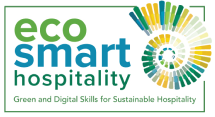As the world shifts toward a more sustainable future, industries across the board are being called to evolve—and the hospitality sector is no exception. It is no secret that hospitality is one of the most resource-intensive sectors globally, contributing significantly to carbon emissions, waste, and energy consumption. Yet, despite these environmental challenges, the hospitality industry has an incredible opportunity to lead the way in adopting green and digital innovations. This is where the EcoSmart Hospitality project comes in, offering much-needed support for the sector to navigate these challenges while remaining competitive and resilient in a fast-changing landscape.
The Environmental Imperative
The hospitality sector is directly linked to global environmental challenges. From energy consumption and water usage to waste production and the carbon footprint of food production, the industry has a significant environmental impact. According to the UN Environment Programme, the tourism and hospitality industry contributes approximately 8% of global greenhouse gas emissions. The need for a sustainable transformation is urgent. Without embracing greener practices, the industry faces stricter regulations, increased operating costs, and a growing disconnect from the environmentally-conscious consumer.
But the good news is that businesses, particularly small and medium-sized enterprises (SMEs), are in a prime position to drive change. With the right support, SMEs can adopt energy-efficient technologies, reduce waste, and make environmentally responsible choices that not only reduce their footprint but can improve their bottom line. The EcoSmart Hospitality project is designed to help these businesses integrate sustainability into their operations—from the ground up. Through targeted training, resources, and practical tools, the project will empower SMEs to thrive while contributing to global climate action.
The Digital Revolution
At the same time, the hospitality sector is being increasingly shaped by digital transformation. From the rise of digital bookings and customer engagement platforms to the use of data analytics and artificial intelligence (AI) in operations, technology is reshaping the way businesses operate. Yet, the adoption of digital tools remains inconsistent across the sector, particularly among smaller enterprises. A study by McKinsey reveals that while larger companies have made strides in digital transformation, many SMEs continue to face barriers to adopting new technologies due to costs, lack of knowledge, and limited access to training.
Digital transformation is no longer optional—it’s a key factor in staying competitive. The global pandemic further accelerated the need for digital innovation, with contactless services, online booking systems, and virtual events becoming the norm. The EcoSmart Hospitality project will help SMEs leverage digital technologies to streamline operations, improve customer experiences, and enhance their sustainability efforts. By integrating AI, digital tools, and sustainable practices, the project will provide businesses with the necessary resources to adapt to the evolving digital landscape.
Bridging the Skills Gap
While the need for sustainability and digital transformation is clear, there’s a significant gap when it comes to the skills required to implement these changes. Research consistently shows that hospitality workers often lack the necessary training in both sustainability and digital technologies. According to the European Commission, only 45% of hospitality professionals have received training in green skills, and an even smaller percentage is equipped to handle the digital tools transforming the industry.
VET (Vocational Education and Training) providers are vital in filling this gap, but many lack the resources and expertise to teach these critical skills. The EcoSmart Hospitality project aims to bridge this gap by providing educators with tailored curricula, resources, and training materials focused on digital and sustainable practices. This will not only help future hospitality workers meet the sector’s needs but will also prepare them for the challenges ahead, ensuring a skilled workforce that can lead the way in both sustainability and digital innovation.
A Vision for a Sustainable and Resilient Industry
EcoSmart Hospitality is not just about meeting regulatory demands or adopting new technologies—it’s about building a more resilient and future-ready hospitality industry. By equipping businesses with the tools they need to succeed in a green and digital economy, the project aims to foster an industry that is not only profitable but responsible. We’re helping the hospitality sector thrive by offering practical solutions that improve operational efficiency, reduce environmental impact, and create a better future for all.
The project’s approach, which combines research, training, and collaboration, offers a powerful model for transforming the sector. As the world moves toward greater environmental awareness and technological advancement, it is crucial that the hospitality industry takes steps now to stay ahead of the curve. EcoSmart Hospitality is here to support that transition—empowering SMEs, educators, and industry stakeholders to create a sustainable, digital-first future for the hospitality sector.
The time for change is now. And together, we can make it happen.
Written by Kathryn O’Brien, EUEI



